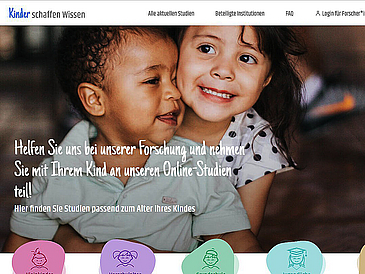How do children think? How do they see the world? How do they acquire knowledge and language? These questions and similar are some research topics in the field of development psychology. At the University of Bremen, the Department of Developmental and Education Psychology within the Faculty of Human and Health Sciences researches the psychological foundations of human cooperation and societal rules – mainly in newborn and child ages. “Forscher Früchtchen” is the name of the group. “With our studies, we want to understand how cooperation, empathy, social norms, and morals develop in children within these age groups,” says Melissa Cherouny, Research Coordinator of the working group that is led by Professor Marco F. H. Schmidt.
Research: Online at the Moment
However, the developmental psychology research is also suffering as a result of the corona pandemic. Usually, the studies are carried out in a fun and child-friendly manner at cooperating partner facilities, such as daycare centers and museums, as well as in the play and study rooms of the “Forscher Früchtchen” group at the university. “That is currently not possible,” according to the research coordinator. “That is why we have developed exciting online studies on the one hand, in which children and parents can participate comfortably from their computer at home. On the other hand, we came together with other research institutes that work in the same or related fields early in 2020 in order to create the network Children Create Knowledge (“Kinder schaffen Wissen”).
How Does the Fox Feel?
In only a few months, the network has managed to collect all developmental psychology research work in German-speaking regions from the participating institutes and to present them in a clear manner on a website. “In the five sub categories small children, pre-school age, primary school, youths, and parents, one can find the relevant study – often more than one – for one’s own child. For example, you can quickly find the How Does the Fox Feel? study (“Wie fühlt sich der Fuchs?”) in the pre-school age category,” explains Melissa Cherouny.
The Bremen working group intendeds to find out how children would predict the emotions of others in various situation with this study. Together with the researchers, the children look at several picture stories where the characters play with each other in different ways. What visitors to the website also find out is that the study is focused on children between the ages of 3.5 and 6.2 years, that it takes 30 minutes, and that you need a webcam, microphone, speaker, or headphones.
Overview of Research is Novel
“The other 27 research institutes are of course just as present as our projects are here,” according to the Bremen scientist. “Such an overview of online studies on children’s thoughts, speech, and behavior, where you can participate with your child, has never existed before.” All current studies are listed and new ones are added regularly. Everyone who is interested in matters of developmental psychology in children and youths can find something here. The University of Bremen working group has contributed a total of three studies.
Parents can find out more about the online offers and find the fitting study for their children on www.kinderschaffenwissen.de. “The studies vary in duration, tasks, and set up. Some of them can be started directly. In contrast, other studies include a video chat with a researcher for which you need an appointment,” explains Cherouny. Parents are able to dive into the worlds of their children in studies and can make a significant contribution to better researching and understanding child development. And a nice side effect: “The children have a great deal of fun with the exciting stories or games that they play as part of a study.”
Further Information:
www.kinderschaffenwissen.de (in German only)
https://www.uni-bremen.de/en/entwicklungspsychologie/child-studies
www.uni-bremen.de/en
Contact:
Melissa Cherouny
Research Coordinator
Department of Developmental and Education Psychology
Faculty of Human and Health Sciences
University of Bremen
Phone: +49 421 218-68762
Email: cherouny@uni-bremen.de

